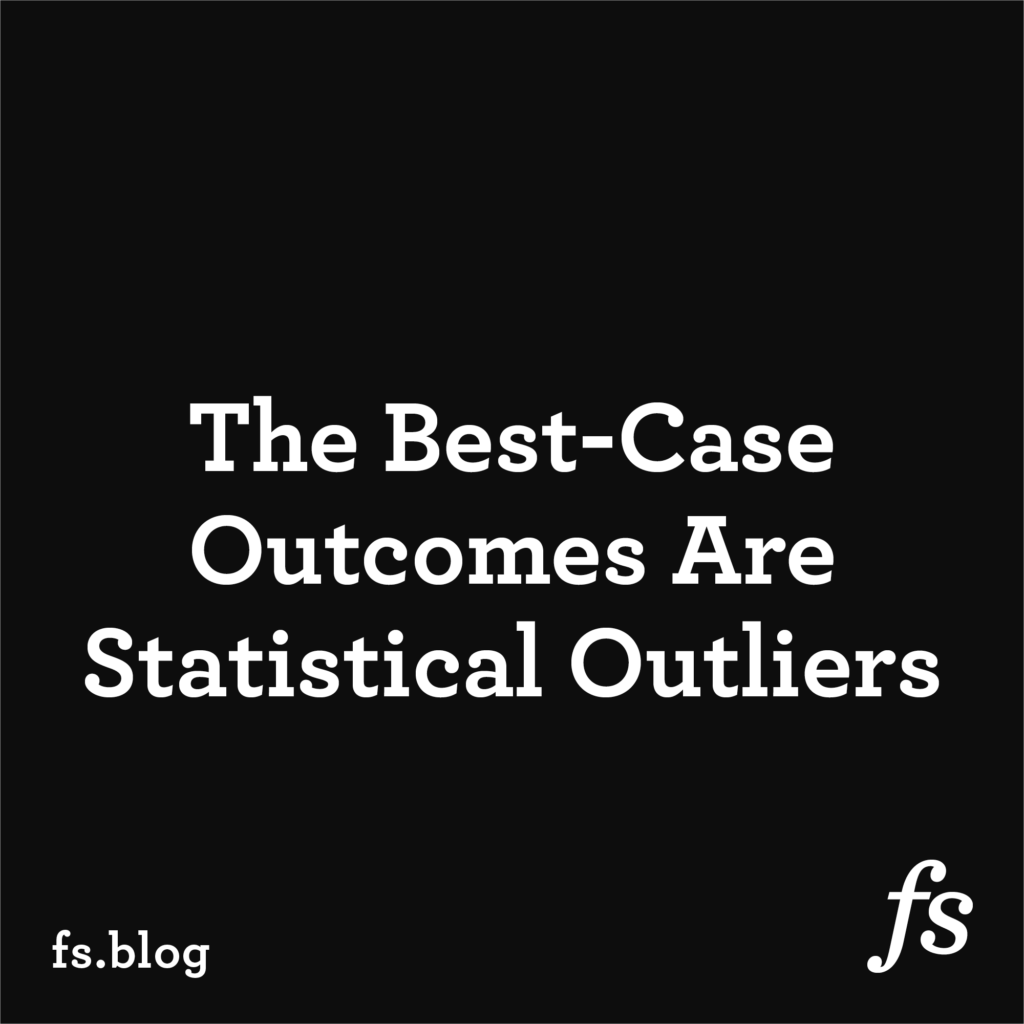The Best-Case Outcomes Are Statistical Outliers
Blog: FS - Smart decisions
There’s nothing wrong with hoping for the best. But the best-case scenario is rarely the one that comes to pass. Being realistic about what is likely to happen positions you for a range of possible outcomes and gives you peace of mind.
We dream about achieving the best-case outcomes, but they are rare. We can’t forget to acknowledge all the other possibilities of what may happen if we want to position ourselves for success.
“Hoping for the best, prepared for the worst, and unsurprised by anything in between.” —Maya Angelou
It’s okay to hope for the best—to look at whatever situation you’re in and say, “This time I have it figured out. This time it’s going to work.” First, having some degree of optimism is necessary for trying anything new. If we weren’t overconfident, we’d never have the guts to do something as risky and unlikely to succeed as starting a business, entering a new relationship, or sending that cold email. Anticipating that a new venture will work helps you overcome obstacles and make it work.
Second, sometimes we do have it figured out. Sometimes our solutions do make things better.
Even when the best-case scenario comes to pass, however, it rarely unfolds exactly as planned. Some choices create unanticipated consequences that we have to deal with. We may encounter unexpected roadblocks due to a lack of information. Or the full implementation of all our ideas and aspirations might take a lot longer than we planned for.
When you look back over history, we rarely find best-case outcomes.
Sure, sometimes they happen—maybe more than we think, given not every moment of the past is recorded. But let’s be honest: even historical wins, like developing the polio vaccine and figuring out how to produce clean drinking water, were not all smooth sailing. There are still people who are unable or unwilling to get the polio vaccine. And there are still many people in the world, even in developed countries like Canada, who don’t have access to clean drinking water.
The best-case outcomes in these situations—a world without polio and a world with globally available clean drinking water—have not happened, despite the existence of reliable, proven technology that can make these outcomes a reality.
There are a lot of reasons why, in these situations, we haven’t achieved the best-case outcomes. Furthermore, situations like these are not unusual. We rarely achieve the dream. The more complicated a situation, the more people it involves, the more variables and dependencies that exist, the more it’s unlikely that it’s all going to work out.
If we narrow our scope and say, for example, the best-case scenario for this Friday night is that we don’t burn the pizza, we can all agree on a movie, and the power doesn’t go out, it’s more likely we’ll achieve it. There are fewer variables, so there’s a greater chance that this specific scenario will come to pass.
The problem is that most of us plan as if we live in an easy-to-anticipate Friday night kind of world. We don’t.
There are no magic bullets for the complicated challenges facing society. There is only hard work, planning for the wide spectrum of human behavior, adjusting to changing conditions, and perseverance. There are many possible outcomes for any given endeavor and only one that we consider the best case.
That is why the best-case outcomes are statistical outliers—they are only one possibility in a sea of many. They might come to pass, but you’re much better off preparing for the likelihood that they won’t.
Our expectations matter. Anticipating a range of outcomes can make us feel better. If we expect the best and it happens, we’re merely satisfied. If we expect less and something better happens, we’re delighted.
Knowing that the future is probably not going to be all sunshine and roses allows you to prepare for a variety of more likely outcomes, including some of the bad ones. Sometimes, too, when the worst-case scenario happens, it’s actually a huge relief. We realize it’s not all bad, we didn’t die, and we can manage if it happens again. Preparation and knowing you can handle a wide spectrum of possible challenges is how you get the peace of mind to be unsurprised by anything in between the worst and the best.
The post The Best-Case Outcomes Are Statistical Outliers appeared first on Farnam Street.
Leave a Comment
You must be logged in to post a comment.








